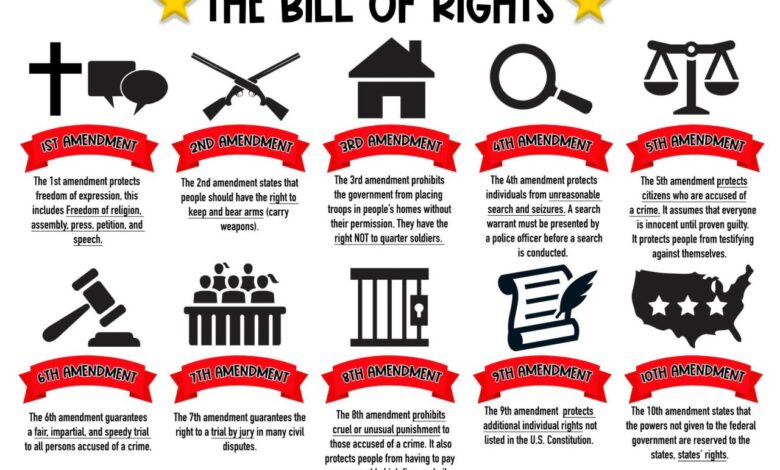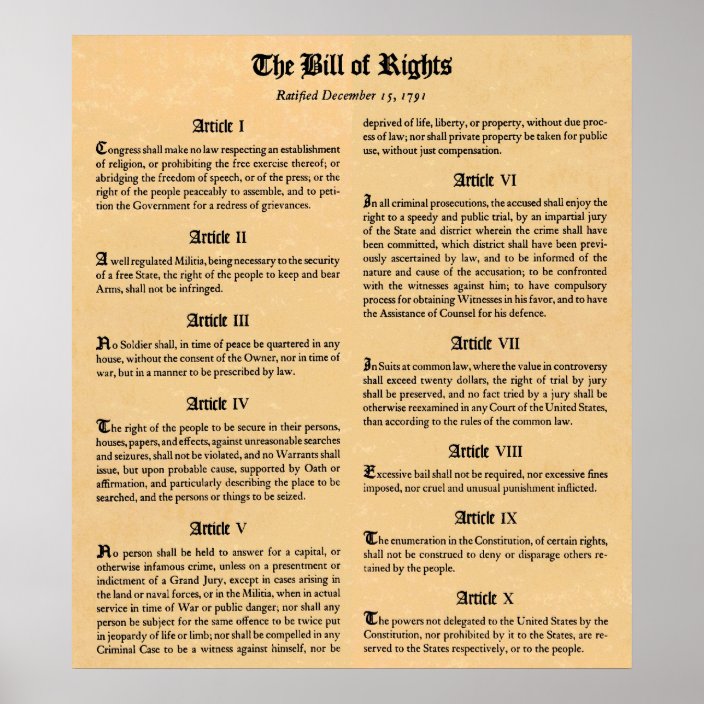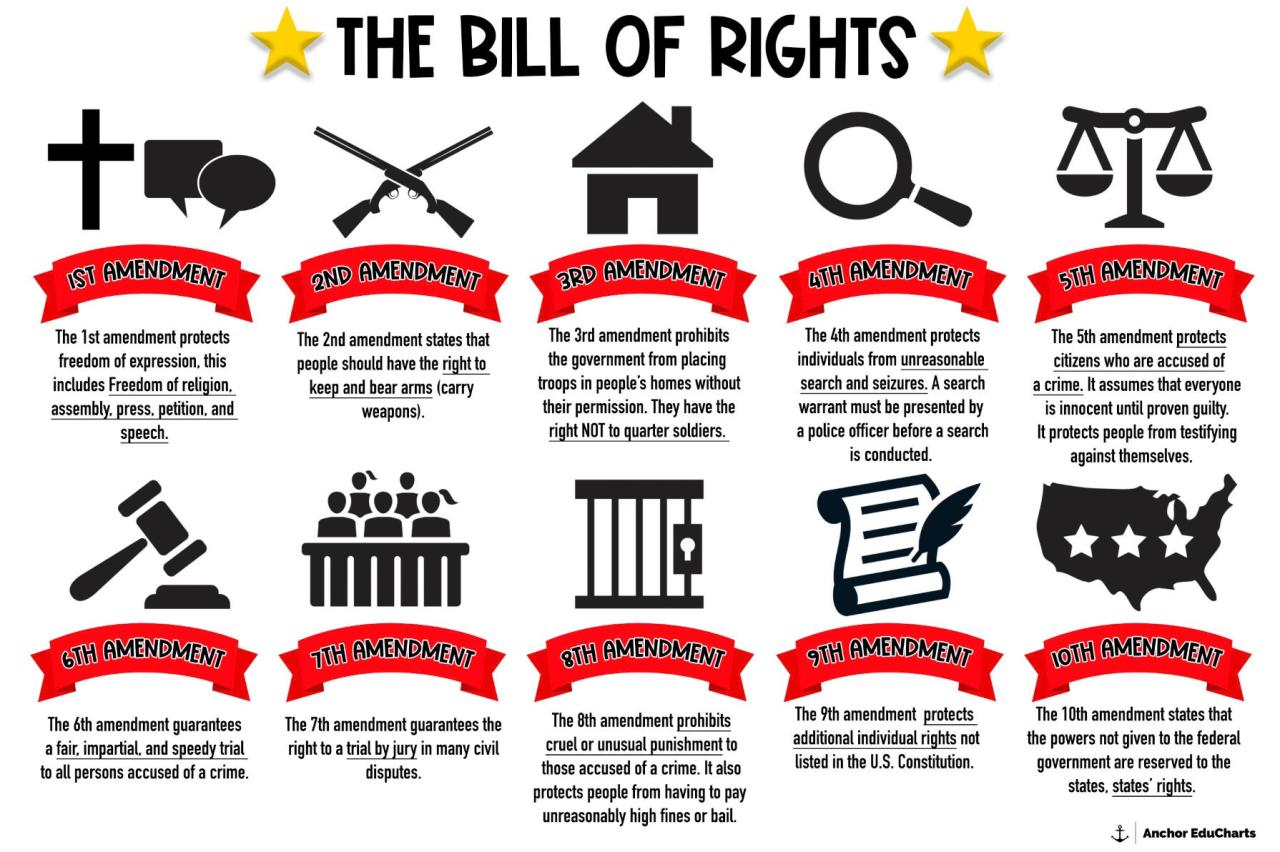
The Bill of Rights: A Foundation for Freedom
The Bill of Rights, a cornerstone of American democracy, stands as a testament to the enduring belief in individual liberty and the pursuit of justice. This collection of ten amendments, ratified in 1791, guarantees fundamental rights and freedoms that have shaped the nation’s identity and continue to be a source of ongoing debate and interpretation.
From the right to free speech and religion to the protection against unreasonable searches and seizures, the Bill of Rights has served as a bulwark against government overreach and a beacon of hope for those seeking a just and equitable society.
Its influence extends far beyond American borders, inspiring human rights movements and legal reforms around the globe.
Historical Context
The Bill of Rights, enshrined in the first ten amendments to the United States Constitution, stands as a cornerstone of American democracy, guaranteeing fundamental freedoms and protecting individual rights. Its genesis can be traced back to the historical events and societal conditions that shaped the nation’s founding.
The Bill of Rights emerged from a confluence of historical experiences, philosophical ideas, and practical concerns. The American Revolution, fought against the oppressive policies of the British monarchy, instilled a deep-seated fear of centralized power and a strong desire for individual liberty.
This sentiment was further amplified by the experiences of colonists under British rule, where restrictions on freedom of speech, religion, and assembly were commonplace.
Key Individuals and Philosophies
The Bill of Rights was influenced by a range of thinkers and philosophies. Enlightenment ideals, particularly those espoused by John Locke, emphasized natural rights and the social contract theory, which posited that government derives its legitimacy from the consent of the governed.
Locke’s writings on individual rights, including the right to life, liberty, and property, had a profound impact on the American Founders.The Bill of Rights also drew inspiration from the English Bill of Rights of 1689, which limited the power of the monarchy and established certain fundamental rights for citizens.
Thomas Jefferson, a key figure in the drafting of the Declaration of Independence, was deeply influenced by Locke’s ideas and incorporated them into the document, declaring that all men are endowed with certain unalienable rights, including the right to life, liberty, and the pursuit of happiness.
Challenges and Concerns
The Bill of Rights was designed to address specific challenges and concerns that emerged during the early years of the United States. One of the primary concerns was the potential for tyranny by a strong central government. The Founders had witnessed firsthand the abuses of power under British rule and were determined to prevent a similar situation in the new nation.Another concern was the need to protect individual liberties from infringement by state governments.
The Founders recognized that even with a limited central government, individual rights could still be threatened by powerful state legislatures. The Bill of Rights was intended to ensure that these rights were protected at both the federal and state levels.
Key Amendments
The Bill of Rights comprises the first ten amendments to the United States Constitution, guaranteeing fundamental rights and freedoms to all citizens. These amendments are crucial in protecting individual liberties and ensuring a just and equitable society.
The First Amendment: Freedom of Religion, Speech, Press, Assembly, and Petition
The First Amendment is a cornerstone of American democracy, safeguarding essential rights related to expression, belief, and participation in government. It enshrines five fundamental freedoms:
- Freedom of Religion:This provision guarantees the separation of church and state, prohibiting the government from establishing a national religion or interfering with the free exercise of religion by individuals. It also protects the right to change one’s religion or to have no religion at all.
- Freedom of Speech:This right protects individuals from government censorship and allows them to express their views freely, even if those views are unpopular or controversial. This includes both verbal and non-verbal forms of communication, such as symbolic speech and artistic expression.
- Freedom of the Press:This clause safeguards the freedom of the media to publish information without government interference. It is essential for a functioning democracy, as it allows for the dissemination of news and ideas, holds the government accountable, and informs the public.
- Freedom of Assembly:This right allows individuals to gather peacefully and to form associations for various purposes, such as political advocacy, social movements, or religious worship. It is a fundamental right for organizing and expressing collective views.
- Freedom to Petition the Government:This right ensures that individuals can petition the government for redress of grievances. It empowers citizens to express their concerns and seek changes in government policies or actions.
The Second Amendment: The Right to Bear Arms
The Second Amendment guarantees the right of individuals to keep and bear arms. This right has been a subject of ongoing debate and legal interpretation, with different perspectives on its scope and application.
The Bill of Rights, a cornerstone of American democracy, guarantees fundamental freedoms and rights to all citizens. It’s interesting to see how corporations like Google, with its massive resources, are navigating the financial landscape, as seen in their recent announcement of a dividend program and a $70 billion stock buyback.
While these actions may be driven by financial strategies, it’s important to consider how such moves impact the larger economic ecosystem and the individual citizens who benefit from the freedoms enshrined in the Bill of Rights.
- Individual Right vs. Collective Right:One of the key debates surrounding the Second Amendment revolves around whether it protects an individual right to own firearms or a collective right for state militias. The Supreme Court has ruled in favor of an individual right to own firearms in cases such as District of Columbia v.
Heller (2008) and McDonald v. City of Chicago (2010).
- Regulation of Firearms:Despite recognizing an individual right to bear arms, the Supreme Court has also acknowledged that the government can regulate firearms to promote public safety. This has led to a complex legal landscape where various types of gun control measures have been upheld or struck down by the courts.
The Third Amendment: Quartering of Soldiers
The Third Amendment prohibits the government from forcing citizens to quarter soldiers in their homes without their consent. This amendment arose from historical grievances related to British troops being billeted in colonial homes during the Revolutionary War.
The Fourth Amendment: Protection Against Unreasonable Searches and Seizures
The Fourth Amendment protects individuals from unreasonable searches and seizures by the government. This amendment is essential for safeguarding privacy and preventing government overreach.
- Probable Cause:The Fourth Amendment requires that law enforcement officers obtain a warrant based on probable cause before conducting a search or seizure. Probable cause means that there is a reasonable belief that a crime has been committed or that evidence of a crime will be found at the location to be searched.
- Exclusionary Rule:The exclusionary rule is a legal doctrine that prohibits the use of evidence obtained in violation of the Fourth Amendment in criminal trials. This rule serves as a deterrent against illegal searches and seizures by law enforcement.
The Fifth Amendment: Rights of the Accused
The Fifth Amendment guarantees several important rights to individuals accused of crimes. These rights are crucial for ensuring a fair and just criminal justice system.
- Grand Jury Indictment:The Fifth Amendment requires that a grand jury issue an indictment before a person can be tried for a serious crime. This provision protects individuals from arbitrary prosecution by the government.
- Double Jeopardy:The Fifth Amendment prohibits the government from trying a person twice for the same crime. This ensures that individuals are not subjected to multiple trials for the same offense.
- Self-Incrimination:The Fifth Amendment guarantees the right to remain silent and to refuse to answer questions that could incriminate oneself. This right is often referred to as the “plea the Fifth” privilege.
- Due Process of Law:The Fifth Amendment requires that the government follow due process of law before depriving a person of life, liberty, or property. This means that the government must follow fair and established procedures in its dealings with individuals.
- Eminent Domain:The Fifth Amendment allows the government to take private property for public use, but only if it provides just compensation to the owner. This provision is known as the “takings clause.”
The Sixth Amendment: Rights of the Accused in Criminal Prosecutions
The Sixth Amendment guarantees several additional rights to individuals accused of crimes, ensuring a fair and impartial trial.
- Right to a Speedy and Public Trial:The Sixth Amendment guarantees the right to a speedy and public trial. This provision is designed to prevent undue delays in the justice system and to ensure that trials are open to the public.
- Right to an Impartial Jury:The Sixth Amendment guarantees the right to an impartial jury trial. This means that the jury must be composed of unbiased individuals who can fairly consider the evidence presented at trial.
- Right to be Informed of the Nature and Cause of the Accusation:The Sixth Amendment guarantees the right to be informed of the charges against oneself. This ensures that individuals are aware of the specific crimes they are accused of committing.
- Right to Confront Opposing Witnesses:The Sixth Amendment guarantees the right to confront the witnesses against oneself. This right allows individuals to question witnesses who are testifying against them and to challenge their credibility.
- Right to Compulsory Process for Obtaining Witnesses:The Sixth Amendment guarantees the right to compel witnesses to appear in court on one’s behalf. This right ensures that individuals have access to witnesses who can provide evidence in their favor.
- Right to Counsel:The Sixth Amendment guarantees the right to have legal counsel in all criminal prosecutions. This right is essential for ensuring that individuals have a fair chance of defending themselves against criminal charges.
The Seventh Amendment: Jury Trial in Civil Cases
The Seventh Amendment guarantees the right to a jury trial in civil cases where the amount in controversy exceeds $20. This amendment preserves the right to a jury trial in civil matters, which was a common law right at the time of the founding.
The Eighth Amendment: Protection Against Excessive Bail and Cruel and Unusual Punishment
The Eighth Amendment prohibits excessive bail and cruel and unusual punishment. This amendment is intended to protect individuals from arbitrary and excessive punishment by the government.
- Excessive Bail:The Eighth Amendment prohibits the government from setting bail that is excessively high, effectively preventing individuals from being released from jail pending trial.
- Cruel and Unusual Punishment:The Eighth Amendment prohibits the government from imposing cruel and unusual punishment. This provision has been interpreted to prohibit punishments that are disproportionate to the crime committed or that are considered inhumane.
The Ninth Amendment: Non-Enumerated Rights
The Ninth Amendment clarifies that the enumeration of specific rights in the Constitution does not mean that other rights not explicitly mentioned are not protected. This amendment acknowledges that the Constitution is not an exhaustive list of all rights and that individuals retain other rights not specifically listed.
The Tenth Amendment: Powers Reserved to the States
The Tenth Amendment reserves powers not delegated to the federal government, nor denied to the states, to the states respectively, or to the people. This amendment reinforces the principle of federalism, ensuring that the states retain significant powers and autonomy.
Rights and Freedoms
The Bill of Rights, enshrined in the first ten amendments to the United States Constitution, is a cornerstone of American democracy, safeguarding fundamental rights and freedoms for all citizens. It establishes a framework for individual liberty, protecting citizens from government overreach and ensuring a balance between individual rights and the common good.
Relationship Between Rights and Individual Liberty
The Bill of Rights explicitly recognizes and protects individual liberties, fostering a society where individuals can exercise their rights without undue interference from the government. These rights are essential for self-expression, personal growth, and participation in a democratic society. The concept of individual liberty, enshrined in the Bill of Rights, is fundamental to American identity and serves as a foundation for a just and equitable society.
Fundamental Rights and Freedoms Guaranteed by the Bill of Rights
The Bill of Rights guarantees a range of fundamental rights and freedoms, including:
- Freedom of Religion:The First Amendment guarantees the freedom to practice any religion or no religion at all, protecting individuals from government interference in their religious beliefs and practices.
- Freedom of Speech:The First Amendment also protects the freedom of speech, allowing individuals to express their opinions and ideas without fear of government censorship. This right is essential for open debate, political discourse, and the free flow of information.
- Freedom of the Press:The First Amendment protects the freedom of the press, ensuring that journalists can report on matters of public interest without fear of government reprisal. This freedom is crucial for holding the government accountable and informing the public.
- Freedom of Assembly:The First Amendment guarantees the right to assemble peacefully, allowing individuals to gather and express their views on matters of public concern. This right is essential for political activism, social movements, and the expression of collective opinions.
- Right to Bear Arms:The Second Amendment protects the right to bear arms, though the scope and interpretation of this right have been the subject of ongoing debate. It is generally understood to protect the right of individuals to own firearms for self-defense and other lawful purposes.
- Protection from Unreasonable Search and Seizure:The Fourth Amendment protects individuals from unreasonable searches and seizures by the government, requiring a warrant based on probable cause before law enforcement can search a person’s home or property.
- Right to Due Process of Law:The Fifth and Fourteenth Amendments guarantee the right to due process of law, ensuring that individuals are treated fairly and justly by the government in legal proceedings. This includes the right to a fair trial, the right to legal representation, and the right to confront witnesses.
- Right to a Fair Trial:The Sixth Amendment guarantees the right to a speedy and public trial by an impartial jury, ensuring that individuals accused of crimes are afforded a fair and just trial. This right is essential for protecting the innocent and ensuring that the guilty are held accountable.
The Bill of Rights guarantees fundamental freedoms, but it doesn’t offer a shield against economic uncertainty. News of the markets tanking over new questions about where the economy is heading raises concerns about the future. The Bill of Rights can’t prevent market fluctuations, but it does provide a framework for navigating those challenges with a focus on individual rights and freedoms.
- Protection from Cruel and Unusual Punishment:The Eighth Amendment prohibits cruel and unusual punishment, ensuring that individuals convicted of crimes are not subjected to inhumane or degrading treatment. This right is essential for protecting the dignity and humanity of all individuals, regardless of their crimes.
- Right to Privacy:Although not explicitly mentioned in the Bill of Rights, the right to privacy has been recognized by the Supreme Court as a fundamental right derived from other amendments. This right protects individuals from government intrusion into their personal lives and decisions.
Comparison with Other Declarations of Human Rights
The Bill of Rights has served as a model for other declarations of human rights around the world. The Universal Declaration of Human Rights (UDHR), adopted by the United Nations in 1948, is a comprehensive document that sets forth fundamental human rights and freedoms for all individuals, regardless of their race, sex, nationality, ethnicity, language, religion, or any other status.
While the UDHR is broader in scope than the Bill of Rights, it shares many common principles, including the right to life, liberty, and security of person; the right to freedom of opinion and expression; and the right to equality before the law.Other international human rights instruments, such as the European Convention on Human Rights and the African Charter on Human and Peoples’ Rights, also draw upon the principles enshrined in the Bill of Rights.
These documents reflect the growing global recognition of the importance of protecting fundamental human rights and freedoms.
Application and Interpretation

The Bill of Rights, while a cornerstone of American democracy, is a living document, its meaning and application constantly evolving in response to societal changes and technological advancements. Its interpretation and application in contemporary society are complex and often contested, reflecting the dynamic nature of individual rights and freedoms.
Interpreting the Bill of Rights
The Supreme Court plays a pivotal role in interpreting the Bill of Rights, shaping its meaning through landmark cases. The Court’s decisions, based on the text of the Constitution, precedent, and evolving societal values, establish legal principles that guide the application of the Bill of Rights in various contexts.
“The Constitution is not a suicide pact.”Justice William Brennan Jr., dissenting in Poe v. Ullman(1961)
The Court’s interpretation is often influenced by the original intent of the framers, but also considers the broader societal context and the evolving understanding of individual rights. For example, the right to privacy, though not explicitly mentioned in the Bill of Rights, has been recognized by the Court as a fundamental right implied by the Fourth, Fifth, and Ninth Amendments.
Evolving Rights and Freedoms in the Digital Age
Technological advancements have significantly impacted the application of the Bill of Rights in the digital age. Issues like online privacy, freedom of speech on social media platforms, and government surveillance raise new challenges for interpreting and applying constitutional rights.
“The right to free speech is the cornerstone of our democracy.”Justice Anthony Kennedy, Citizens United v. Federal Election Commission(2010)
The Court has grappled with these challenges, balancing individual rights with societal concerns. For instance, in Riley v. California(2014), the Court ruled that police need a warrant to search a suspect’s cell phone, recognizing the unique privacy concerns associated with digital data.
Landmark Supreme Court Cases, The bill of rights
- Gideon v. Wainwright(1963): Established the right to legal counsel for indigent defendants in criminal cases. This case expanded the Sixth Amendment’s right to counsel to include all felony cases, ensuring a fair trial for all.
- Roe v. Wade(1973): Recognized a woman’s right to abortion under the Fourteenth Amendment’s right to privacy. This landmark decision remains highly controversial, with ongoing debates about the scope and limitations of abortion rights.
- Miranda v. Arizona(1966): Established the Miranda warnings, requiring law enforcement officers to inform suspects of their constitutional rights, including the right to remain silent and the right to legal counsel.
- Brown v. Board of Education(1954): Declared state laws establishing separate public schools for black and white students unconstitutional, overturning the “separate but equal” doctrine established in Plessy v. Ferguson(1896).
Contemporary Issues
The Bill of Rights, a cornerstone of American democracy, continues to be a subject of ongoing debate and controversy in the 21st century. As society evolves and technology advances, the meaning and application of these fundamental rights are constantly being challenged.
This section explores some of the most pressing contemporary issues related to the Bill of Rights, examining the complexities and tensions that arise in balancing individual liberties with collective interests.
Freedom of Speech in the Digital Age
The First Amendment’s guarantee of freedom of speech has taken on new dimensions in the digital age. While the internet has provided unprecedented opportunities for individuals to express themselves, it has also raised concerns about the spread of misinformation, hate speech, and online harassment.
Courts have grappled with the question of how to balance the right to free speech with the need to protect individuals from harm.
- Online Platforms and Content Moderation:Social media platforms have become powerful intermediaries in the flow of information. They face increasing pressure to moderate content that is deemed harmful, such as hate speech, violent threats, and misinformation. This raises questions about the role of private companies in regulating speech and whether they should be held accountable for content that appears on their platforms.
- Cyberbullying and Online Harassment:The anonymity and reach of the internet have facilitated cyberbullying and online harassment. Victims often struggle to protect themselves from the emotional and psychological harm caused by these activities. The legal framework for addressing cyberbullying and online harassment is still evolving, with debates about the balance between free speech and the need to protect individuals from harm.
Gun Control and the Second Amendment
The Second Amendment’s guarantee of the right to bear arms remains one of the most contentious issues in American politics. Debates over gun control have intensified in recent years, fueled by mass shootings and concerns about gun violence. This section explores the legal and social challenges surrounding gun control in the United States.
The Bill of Rights is a fundamental document in American history, guaranteeing essential freedoms. It’s interesting to see how these rights are reflected in the tech world, where companies like Google, the creator of Android, are constantly evolving. Even though android loses market share to ios but still dominates overall , the platform continues to innovate and provide access to information, communication, and entertainment.
Just as the Bill of Rights safeguards individual liberties, so too do these technological advancements shape our modern world.
- The Right to Bear Arms:The Second Amendment’s guarantee of the right to bear arms has been interpreted differently throughout history. While some argue that it protects an individual’s right to own firearms for self-defense, others contend that it only applies to the right of states to maintain militias.
The Supreme Court has ruled in favor of an individual right to bear arms in several cases, but the scope and limits of this right remain subject to debate.
- Gun Violence and Public Safety:The United States has a significantly higher rate of gun violence compared to other developed countries. This has led to calls for stricter gun control measures, such as background checks, bans on assault weapons, and limits on high-capacity magazines. However, these proposals have faced strong opposition from gun rights advocates who argue that they infringe on the Second Amendment rights of law-abiding citizens.
- Mental Health and Gun Ownership:The relationship between mental health and gun ownership is a complex issue. While some argue that mental health issues should be considered in gun control laws, others believe that such measures would unfairly stigmatize individuals with mental illness. The debate over mental health and gun ownership highlights the challenges of addressing gun violence while respecting individual rights.
Impact and Legacy
The Bill of Rights, enshrined in the first ten amendments to the United States Constitution, has profoundly shaped American society and culture, serving as a cornerstone of its democratic principles and individual liberties. Its enduring impact is evident in various aspects of American life, from legal precedents and social movements to the very fabric of American identity.
Influence on American Democracy and the Rule of Law
The Bill of Rights has played a pivotal role in shaping American democracy and the rule of law. It established a framework for individual rights and freedoms, ensuring that the government could not infringe upon these fundamental liberties. This framework has served as a bulwark against tyranny, guaranteeing that citizens have the right to free speech, freedom of religion, the right to bear arms, protection against unreasonable searches and seizures, and due process of law.
These rights are not merely abstract principles but have been repeatedly invoked in legal challenges, landmark Supreme Court decisions, and everyday life, ensuring that the government operates within the bounds of the Constitution.
Inspiration for Human Rights Movements and Legal Reforms Around the World
The Bill of Rights has served as a beacon of hope and inspiration for human rights movements and legal reforms around the world. Its principles of individual liberty, freedom of expression, and equality have resonated with people struggling for basic rights and freedoms in diverse contexts.
For instance, the Universal Declaration of Human Rights, adopted by the United Nations in 1948, draws heavily from the principles enshrined in the Bill of Rights.
- The Bill of Rights has been a source of inspiration for constitutional reforms and human rights movements in countries like India, South Africa, and many others. It has served as a model for incorporating fundamental rights and freedoms into their own constitutions, paving the way for greater individual liberties and democratic governance.
- The Bill of Rights has also been instrumental in shaping international human rights law. The International Covenant on Civil and Political Rights, ratified by over 170 countries, echoes many of the principles found in the Bill of Rights, including the right to life, freedom of speech, and protection from arbitrary arrest.
Closing Notes: The Bill Of Rights

The Bill of Rights, a living document that continues to evolve with the changing times, remains a vital expression of American values. Its enduring relevance lies in its ability to adapt to new challenges while upholding the fundamental principles of individual liberty and the rule of law.
As we navigate the complexities of the 21st century, the Bill of Rights serves as a constant reminder of the importance of protecting our rights and freedoms for generations to come.






